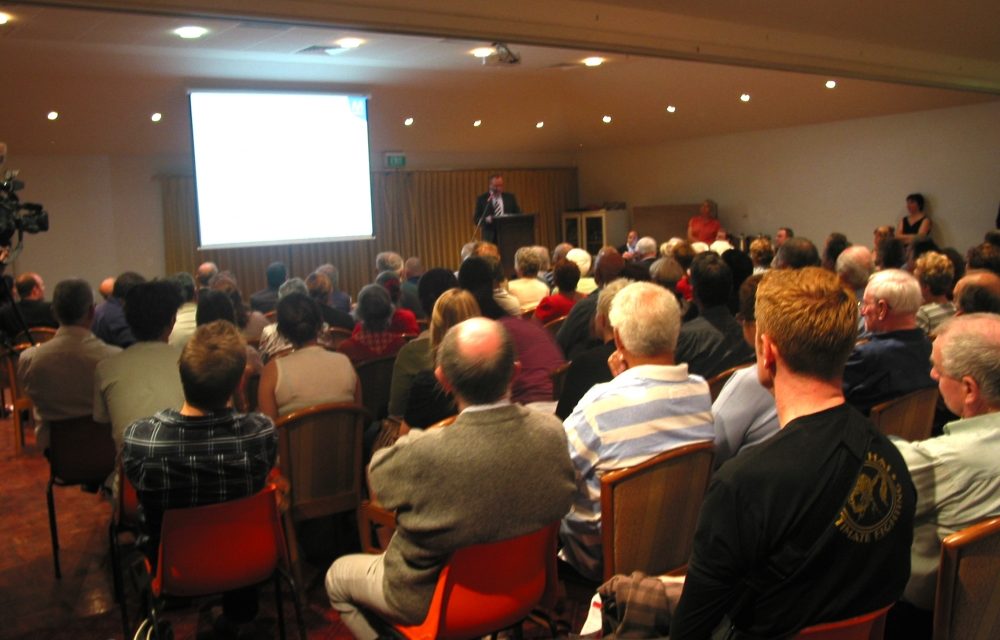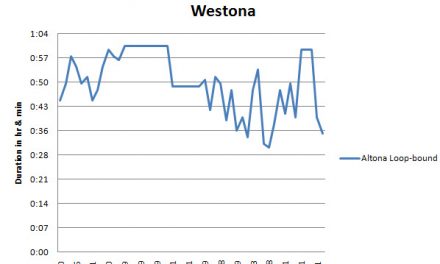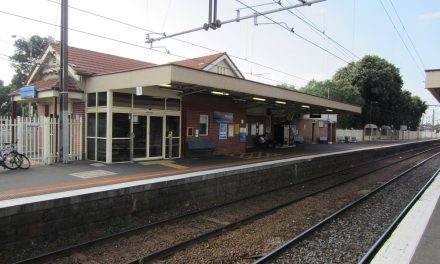A community meeting was hosted by Greens MLC Colleen Hartland at the Louis Joel Centre on 3 March 2011, 7.30-9 pm to discuss the proposed train service changes affecting the Altona Loop and to come up with strategies for dealing with the problem. I wish to emphasize the word “proposed” as this is not set in stone so it is possible to turn round the proposals if the Community works hard against it. The turnout was so overwhelming that those who arrived later could not enter the venue due to lack of standing space and Colleen had promised to hold the next meeting in a larger venue.
The Guest Speaker is Dr. John Stone, a transport expert from Melbourne University. All the upper and lower house MPs in the region had been invited to attend this meeting. The Green members and one local Labour member had turned up. The two Liberal MPs did not attend. The Public Transport Minister and Metro replied that they were not coming for the meeting.
Dr. Stone started off by saying it is unusual that of the invited speakers, he was the only one to attend and give a presentation. Metro or the Public Transport Minister should be the authority explaining the changes to the residents. In other countries, the Transport Authority would be sitting down with the end-users to see how their concerns can be addressed. Here the authorities decide to stay away from the people most affected and announce the changes through the media. He himself too learnt about the timetable change indirectly from the Herald Sun, which were skimpy and devoid of details. In fact, the audience had later asked many questions in which Metro or the Transport Department will be best suited to answer. I hope Metro and the Transport Department would attend future community meetings to clarify the doubts the residents have. After all, the residents have the right to know what will be affecting them in a democratic, consultative society.
There were many questions and concerns from the audience. Some issues raised include:
1. Metro had told Dr. Stone that the number of train services will remain the same under the change. A lady questioned how could this be possible if trains run every 22 minutes instead of 20 minutes. 2 minutes is a small difference for a single journey but can turn out to be quite significant if this is multiplied by the number of journeys each week. Correspondingly, the number of weekly services will have to be reduced if the train frequency is to be lowered. Dr. Stone replied that Metro had told him the trains will run every 22 minutes during peak hours and every 20 minutes during non-peak hours, which is really strange as you will be expecting more frequent services during peak hours. I guess the cut in train services to the western suburbs is used to feed in more services to lines such as Sandringham, where trains will run every 8 minutes instead of the current 10-11 minutes, under the new timetable (Ref 1, 2). It is hard to qualify the change as an improvement if increased services in some parts of the network are achieved at the expense of service deterioration in other parts.
2. Dr. Stone learnt from Metro the waiting time to connect trains at Newport or Laverton will be about 5 minutes. However, a RMIT student in the audience pointed out that one cannot rely on this information. Werribee passengers getting off at City Loop stations were told that their journey time would increase by 8 minutes when Werribee trains ran direct to Flinders Street during peak hours. However, he found out that his journey time increased by 20 minutes.
3. Dr. Stone was also told that all Laverton trains through Altona will stop all stations, including South Kensington, to the City during peak hours. The current express services that run from Newport to Footscray, then to North Melbourne or vice-versa during peak hours will no longer run. This means that Altona passengers will face a longer journey during peak hours and the need to change trains at Newport during non-peak hours.
4. A man asked if the Transport Minister Terry Mulder is legally bound by the contract with Metro to accept the timetable changes, as mentioned in the newspapers (Ref 3). Dr. Stone replied that as the Transport Minister, he has the authority to decide whether to accept and reject the proposed changes from Metro and not be dictated by whatever changes the train operator has recommended.
5. Another man asked if it was the single tracks in the Altona Loop that led to the decision to run the loop as a shuttle service. Dr. Stone replied that there are single track sections in several other parts of the network and these have not been an issue. It is a matter of coordinating the signalling before and after the single track sections. Likewise, if the signalling at Newport and Laverton are managed well, there would be no problem.
6. In replying to a question if the transferring of the train shuttle service from Williamstown to Altona would make the system more efficient, Dr. Stone said this would not make any difference.
7. A number of people in the audience were concerned about the definition of peak and non-peak hours, that is, precisely at what times each day will the shuttle train start plying the Altona Loop? This is because work patterns have changed, with different people going to work and knocking off at different times. Hence, the peak hours should correspondingly be lengthened to accommodate the variations.
8. A lady said that her daughter with disability problems encounter difficulty boarding packed trains at Seaholme during peak hours. So her daughter makes use of non-peak hours to board a single train from Seaholme to Melbourne Central. Under the new system, she will have to change train at Newport and again at North Melbourne, taking 3 trains in total to reach her destination. This change will force her to give up her independence as the journey will be too arduous to negotiate. She will like to know whether the Transport Department has taken into consideration the needs and welfare of these people.
9. Another lady said that she often has to work late and take night trains home. With the change, she will have to wait at Newport Station for the connecting train. She is very worried about security at Newport Station as she has heard that it is not safe there at night. The audience will like to know whether there will be enhanced security at the connecting stations.
10. There are many tourists coming to Altona Beach by train during non-peak hours. The traders are concerned how this change would affect the local economy and what inconvenience it would bring to tourists from other suburbs? This taking away of train services is working in reverse to the efforts of Hobsons Bay City Council in rebranding the Altona Station to Altona Beach Station so as to improve the image of Altona and to attract more tourists to Altona.
11. Some Altona residents will drive to Laverton or Newport to take the direct trains there. Will the authority be building more carparking spaces at Laverton and Newport to handle the increase in demand? Doesn’t this defeat the purpose of having 3 train stations in Altona and encouraging people to use more public transport rather than cars?
12. There are quite a number of students who travel from Altona to Victoria University in Footscray during off-peak hours. The short travelling time may be considerably lengthened under the change and students will spend unproductive time travelling rather than studying.
13. A lady heard from somebody working in Metro that the Altona Loop will eventually be duplicated and that the Altona shuttle train will be made permanent to run during both peak and non-peak hours. This is something that needs to be verified from Metro.
14. A man had asked whether the rumour that Westona will be converted to a Zone 2 station is true. Dr. Stone said he has no knowledge of this happening.
15. A lady asked about when good bus-train connectivity is going to happen. Dr Stone said that this question was posed before the train operation was privatized. The answer given was that somehow this would happen as the various heads were sitting next to each other in a meeting. After the privatization when people were no longer sitting together, he had a student who did a project by going to the various transport authorities and asked who was coordinating the bus-train connectivity. Everyone answered it was someone else who was responsible.
16. Dr. Stone was asked about his personal opinions of the timetable change. He felt this is a lazy way of scheduling more services as there are other much better ways to achieve the same outcome.
I may have missed out some issues raised or there may be some lapses/inaccuracies in the issues raised. You can probably get more details from the following sites:
https://westonaloop.blogspot.com/
https://mps.vic.greens.org.au/transportwest
A man said that there are many politicians at the meeting. With their political experience, what would be the best approach to tackle the problem. The reply is to apply political pressure to bring out the desired outcome and the following strategies have been suggested at the meeting:
- When the Greens and Labour said they would work together on this issue through a bipartisan approach, this drew loud applause from the audience.
- Exercising pressure on the 2 Liberal MPs.
- Complaints will be made to Metro so that a request can be made to the Transport Ombudsman to investigate.
- Sending petitions to the various authorities and MPs.
- A demonstration was suggested. When an old lady said she would not take off her top, like the taxi drivers, the audience broke into laughter. Colleen followed on, saying she would not too but she would not object to anyone planning to do so. A lady interjected that this would be good for attracting attention, particularly from the mass media.
- Asking mass media to cover this campaign so as to increase publicity and awareness of this issue. A reporter from the local newspapers was present at the meeting.
- A blog (https://westonaloop.blogspot.com/) has been set up to provide updates on the campaign. A Facebook page is also suggested to connect with people.
- There will be a committee driving this campaign and further community meetings will be held.
In the worst scenario that despite all the petitions and the authorities still refuse to budge, we should still bargain for a less painful deal for Altona. Dr. Stone said that in situations where passengers are adversely affected, there should be compensatory measures to make up for the inconvenience caused. I feel that it will not be asking too much to request for the following in return:
1. Promise that the Altona shuttle service will not be extended to peak hours.
2. Extend the peak hour span for Werribee trains running through the Altona Loop to accommodate variations in work patterns.
3. An Altona shuttle train should be given priority to enter Newport or Laverton Station in preference to the scheduled connecting Werribee train so that passengers on a late-running Altona shuttle train will not miss the connecting Werribee trains to continue their journey.
4. Assurance that the waiting time to connect trains at Newport or Laverton will be short.
5. Promise that peak hour services through Altona will not be converted to express services skipping the Altona Loop, in the event of train delays and cancellations.
6. People do not need to hurry to work during weekends so it does not really make sense to turn the Altona Loop into a shuttle during weekends. Werribee trains should run through Altona during weekends so that people from other western suburbs can easily come to Altona Beach for recreation and there is less impact on the local traders. A lot of tourists also visit the Altona Beach Market on Tuesdays. It will be great to make Tuesday a shuttle-free day, which is good for tourists, local traders and the suburb vibrancy.
7. Have direct service through Altona during late nights. Imagine that you are so tired after a full day work and you still have to wait for a shuttle at Newport, worrying about your security while you are waiting.
8. Have somebody collect the statistics after the change has been implemented (like what is still being done to the shuttle bus 401 between North Melbourne station and Melbourne University). These statistics may include the waiting time to connect trains, average journey time from Altona to the City (pre and post-change), Altona passengers not able to board a packed Werribee train at Newport, etc. The statistics should be publicly viewable.
9. A study conducted to see if turning the Altona Loop into a shuttle service has improved service reliability, quality and quantity. If it has not made a difference or has resulted in service deterioration, then the arrangement should be reversed. I do not know of any study that has been undertaken to see if taking Werribee trains out of the City Loop did really “untangle” the system and result in improved system efficiency and reliability. A lot of propositions may be just myths that require validations so it is important to be more evidence-based, transparent and accountable.
One phrase deeply imprinted on my mind was that said by Colleen Hartland: “Do not give up hope. You deserve a decent service.” (roughly what she means, may not be the exact rendition)






I live in Altona near Pier St and I go to Swinburne University. The timetable changes suck. And as usual, no matter how much public outcry, nothing will happen. I'll consider driving to uni and increasing my carbon footprint once again!
For more information about local issues, including the proposed reduction in train services to Altona and Seaholme, please visit my website at http://www.briffa.org
Regards,
Tony
____________________
Cr Tony Briffa
Deputy Mayor, City of Hobsons Bay
Councillor for Altona and Seaholme
http://www.briffa.org